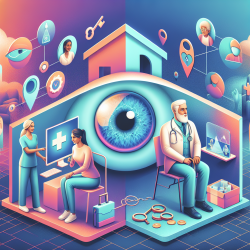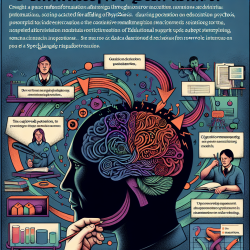Unlocking the Secrets to Better Outcomes: How Informatics-Enabled Evidence Generation Can Transform Your Practice!
As practitioners in the field of speech-language pathology, we are always seeking ways to improve outcomes for the children we serve. The integration of informatics into our practice is a game-changer that can lead to more effective interventions and better results. The research article "Reimagining the research-practice relationship: policy recommendations for informatics-enabled evidence-generation across the US health system" offers valuable insights that can help us achieve these goals.
Understanding the Evidence-Generating Medicine (EGM) Paradigm
The EGM paradigm emphasizes the systematic incorporation of research into clinical practice. By utilizing electronic health records (EHRs) and other health information technologies, practitioners can generate evidence from real-world practice, transforming the traditional clinical research system. This approach not only enhances evidence-based medicine (EBM) but also enables a learning health system (LHS) where each healthcare encounter contributes to our understanding of effective interventions.
Key Recommendations for Practitioners
To effectively implement the EGM paradigm in your practice, consider the following recommendations:
- Integrate Research at the Point-of-Care: Engage clinicians, patients, and health systems in research activities. This can be achieved by incorporating research functions into EHRs, such as patient recruitment and result integration.
- Leverage Health IT Systems: Use health IT systems to develop and deliver new interventions. This includes utilizing data standards and certified health IT functionalities to facilitate evidence generation and local learning health systems.
- Enhance Workforce Competencies: Invest in informatics training for your team. This will improve their ability to apply informatics principles to healthcare problems, leading to better outcomes for patients.
Encouraging Further Research and Policy Development
The research article also highlights the importance of ongoing policy development to support the EGM-EBM paradigm. By advocating for public policies that facilitate evidence generation on a national scale, practitioners can contribute to the acceleration of biomedical discovery and the translation of findings into practice.
Conclusion
Incorporating informatics-enabled evidence generation into your practice can lead to transformative outcomes for the children you serve. By integrating research into clinical care and leveraging health IT systems, you can enhance the effectiveness of your interventions and contribute to the advancement of the field. For those interested in further exploring these concepts, I encourage you to delve deeper into the original research article.
To read the original research paper, please follow this link: Reimagining the research-practice relationship: policy recommendations for informatics-enabled evidence-generation across the US health system.










